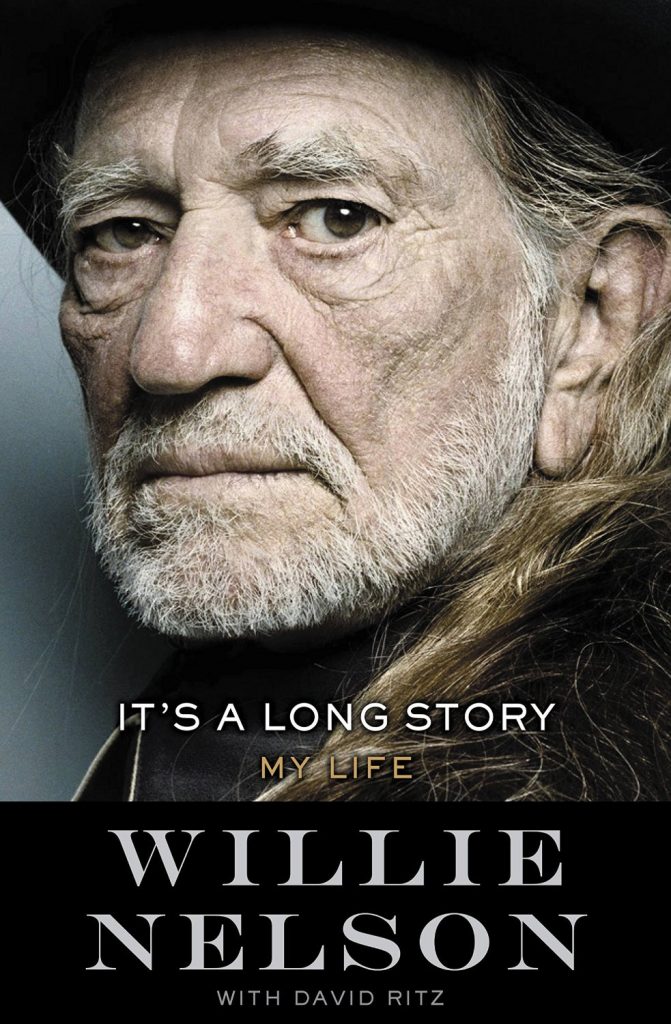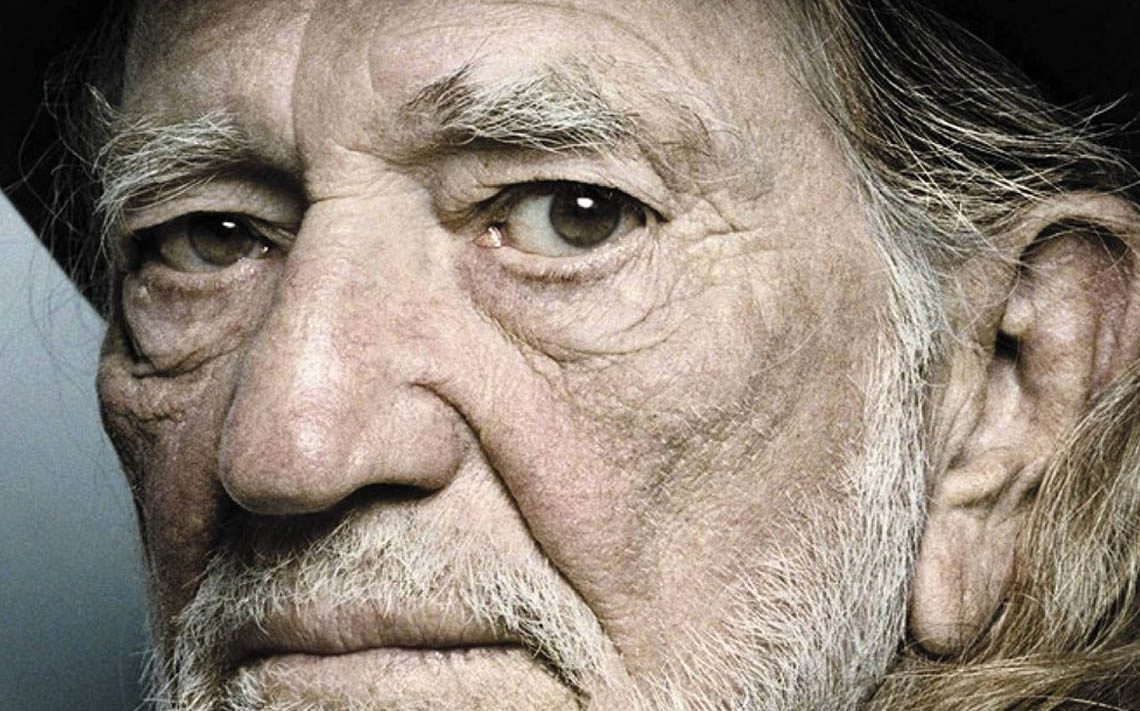 It’s A Long Story: My Life
It’s A Long Story: My Life
By Willie Nelson with David Ritz
Little, Brown
By Diana Finlay Hendricks
With more than a dozen autobiographies and collaborations — and a world-class definitive non-authorized biography — already on the shelves, why another Willie Nelson book? Because, as the title explains, “It’s a long story.”
It’s A Long Story: My Life is easily worth the $30 investment if for no other reason than that it should be read twice. It will take a solid read through and then a revisit to catch the authentic voice and nuances of the book.
On first read, the cynical reader may be quick to criticize David Ritz as a hired gun “autobiographer,” having pseudo-ghost-written similar books for everyone from Ray Charles and Aretha Franklin to Buddy Guy and Don Rickles. Yes, at first pass, much of It’s A Long Story appears to be little more than transcribed digital tapes following Nelson down tangents and backroads, through rambled conversations on a vapor-filled bus.
The second read brings to light the voice and vernacular of the world’s most beloved poet and picker. Ritz captures Willie’s humor in his entire life, as he tells familiar stories in that distinctive voice.
As with all of Willie’s autobiographies, the introduction is worth the price of the book. He is enthusiastic, energetic and fired up to tell his story. He quotes songwriter Harlan Howard’s, “A song ain’t nothin’ but three chords and the truth.” And he talks about how songs come easy to him, comparing them to “little stories that fall out of our lives and imaginations.” Good advice for all writers, Willie explains, “The truth should flow easy. Same for stories and songs. If you overanalyze or torture yourself to bring them to life something’s wrong. Just the way a mountain stream, bubbling with fresh clean water, keeps flowing, stories need to flow free and easy. The source of the water, like the source of the songs, come from on high. It’s a natural thing ….”
The reader can readily imagine Willie sitting on the bus, inhaling and rambling, as the stories flow through a life well-lived. His words, like his song lyrics, are simple, homespun, but like so many prophets, those words are global, as he says, “Memories remind us that every moment of our lives, even the most tragic, have contributed to our strength. We’ve gotten through. We’re still here.”
“We’re still here” could be a recurring theme in It’s A Long Story. He tells the stories that we have heard and read before — in his own voice — in collective detail, of the eight decades of “successes and failures, heartbreaks and breakthroughs, miracles and mind-fucks.”
Willie has always been well-read. He compares the T.S. Eliot poem, “East Coker,” that begins with “In my beginning is my end” and concludes with “In my end is my beginning,” to his song, “Still is Still Moving To Me.” With that, he starts the book in the middle of his life, with the IRS story. From there, David Ritz earns his keep as he manages to semi-organize the stories of “My Beginning”: his early life; “Songs Falling from the Sky”: the Nashville years; “Teardrops and Flowers”: game-changers, rebooting, reunions, picnics and farmers; “Over the Rainbow”: movie-making, family losses, and Maui; and “Spirit”: legalization, destiny, and back home to Abbott.
His end, like T.S. Eliot’s, is his beginning.
The un-chronology makes perfect sense on the second read. It captures the essence of that bubbling mountain stream Willie talks about in the introduction.
A familiar theme in all of Willie’s books is the sincere, best intention that Willie has for writing this story. In many of the books, his interest wanes or life gets in the way of good intentions and the heavy lifting winds up being done by the co-writer. This one is different. Maybe he has hit his stride at eight decades, but It’s A Long Story is arguably the most authentic voice of the Willie Nelson autobiographies. Where many of the autobiographers before were forced to fill in the gaps to fill the pages, this book carries Willie’s voice, humor, and spirit from beginning to end. And if it is to be criticized for telling the same old stories again and again, go back and read the subtitle: My Life. How many ways can you tell the story of one life?
The Willie-phile won’t learn much about the Red-Headed Stranger that he didn’t already garner by reading the definitive Willie Nelson: An Epic Life, by Joe Nick Patoski (Little, Brown, 2008) In fact, most of the stories are similar, if not word-for-word “gospel.” Patoski was not the first to tell the stories, but he was by far the most authoritative. But while It’s A Long Story may not be a definitive work about the life and times of this American music icon, it is by far, the best companion to Willie Nelson: An Epic Life. Read Patoski’s book first. Then sit back and enjoy the Gospel According to Willie.
Further Reading:
Five more Willie books worth your while
- Willie Nelson: An Epic Life (Joe Nick Patoski; Little, Brown 2008)
A 2008 Texas Book Award winner, this is the definitive biography on the Red Headed Stranger, with background, research, and interviews with virtually everyone in Willie’s life, including Nelson, himself. A comprehensive notes section adds to the definition of this as THE go-to book on everything Willie — an epic undertaking, but Patoski, one of the top three leading experts in Texas music and culture, proves the perfect man for the job. - The Tao of Willie: A Guide to the Happiness in Your Heart (Willie Nelson and Turk Pipkin; Gotham, 2006)
After Patoski’s An Epic Life and Nelson and David Ritz’s It’s a Long Story, this is easily the third most important book to have in a complete Willie library, offering the most in-depth and introspective take the legend’s personal philosophy of life. In the words of Turk Pipkin, a longtime good friend of Nelson’s, “Many of Willie’s thoughts are more Baptist than Buddhist, some more cowboy than Indian, but all have stood the test of time …” - Willie: An Autobiography (Willie Nelson with Bud Shrake; Simon and Schuster, 1988)
Another introspective collaboration by Willie and a good friend (award-winning writer Bud Shrake), this book topped the list before Patoski’s Epic Life went to press. It’s a much shorter read than either Patoski’s or Ritz’s efforts, but it’s well-written and covers a lot of the high points — although the stories coast to an end in 1987, as Shrake begins to edit, cull and sort the rambling into book form. Nelson and Ritz actually cover a lot of the same ground in the newer It’s a Long Story, but the stories ring a little fresher in Shrake’s book — perhaps because Willie himself was only 55 at the time it was published. - The Facts of Life and Other Dirty Jokes (Willie Nelson with Larry McMurtry, Random House, 2003)
Willie jumps in with both feet and the feel of a classic standup comic in the opening pages of this one. Self-effacing humor coupled with favorite old friends and their jokes bring a bawdy, and sometimes vaudevillian sense to this light, fun read. As Pulitzer Prize-winner Larry McMurtry writes, “The book, like the music and the movies, appeals because Willie himself appeals. We’d all be smaller without him.” - Roll Me Up And Smoke Me When I Die: Musings From the Road (Willie Nelson, Foreword by Kinky Friedman, Illustrations by Micah Nelson; Harper Collins, 2012)
Consider this one an honorable mention if you must, but it’s still a delight. Ever the economist with keystrokes and ink, Kinky Friedman tells the most succinct story of Nelson’s life in a five-page intro that begins, “In April, 1933, Willie’s mother Myrle, gave birth to him in a manger somewhere along the old highway between Waco and Dallas. There were angels in attendance that night and there would be for the rest of his life. Some of them, no doubt, flying too close to the ground.” After foreword, Willie serves up a seemingly random and oftentimes half-baked (or perhaps all-too-fully baked) assortment of memories, jokes, and musings. There’s not much to it, admittedly, but the combo of Friedman’s wit and Willie’s casual charm are hard to resist.






good book …just wish I hadn’t read the last chapter and found out he rallied against the XL pipeline. It seems to me any fool would know the oil is going to get there anyway and if it can not go by pipeline its going to go by railroad which is worse?